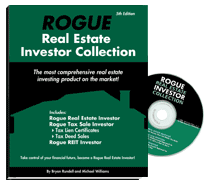|
Are thinking of investing in real estate?
Would like to buy some rental property and let the renter pay down the mortgage?
Does the word "caveat emptor" sound familiar? Let the buyer beware! Real estate investing, including owning your own home, is a great way to enjoy a piece of the American Dream, but it comes with a price.
Rarely have I seen a realistic portrayal of both the good and the bad sides of real estate investing. Many late night infomercials and countless books would have you believe that "no money down" and creative financing techniques can take you from rags to riches with little more than the classified advertisements, a phone and a quick appointment to consummate the deal.
On the other hand, friends, family and even the Wall Street gurus will tell you that real estate investing is just not a good idea. It’s not a liquid investment. The tax advantages were taken away in 1986. Renters are all low-life, societal rejects who are intent on destroying your property and living in your rental house for free. And now everyone is petrified about soaring real estate values, while they continue to pay for stocks that are valued at 40 to 100 times what they are worth.
As is usually the case, the truth lies somewhere in between. Few people will argue that owning your own home is a bad idea. After all, it is a forced method of investing in a financial instrument that you can see and feel, and the taxes and insurance are even deductible.
What about all the other ways to invest in real estate?
Contrary to what most people think, there are many different ways to invest in real estate:
- If you are a passive investor who desires a low-risk investment with almost no hassles that consistently returns about 15 percent per year, Real Estate Investment Trusts (REITs) might be your ticket.
- If you don’t mind doing a little research, making some phone calls and possibly going to an auction, then tax lien certificates might interest you.
- If you are ready to get your hands dirty, but loathe the prospect of dealing with renters, then you might like buying undervalued real estate that you can fix up for a tidy profit.
- Finally, if you have enough courage to deal with renters, consider letting someone else pay down a mortgage and leave you with a handsome nest egg.
As you can see, I’ve only presented a few options for investing in real estate. It is my opinion that real estate should be an important part of an investor’s portfolio.
Why?
First, land is a precious commodity that is more or less finite during our lifetime. The population of the world is growing and we will need more land to support the voracious demands of the human species. Second, natural resources such as lumber and building supplies are dwindling. With fewer supplies, prices are rising and existing homes are becoming more valuable. Finally, real estate is one of the few investments where you can use a little of your money and a lot of someone else’s money (i.e., a mortgage company) to control a large investment.
Now, let’s get back to the truth about real estate investing. As a real estate investor, I have read many books on the subject. I have attended seminars and classes, and I have purchased more than one of the infomercial programs. There is a lot of good information to be learned from this material; however, most real estate courses come at a hefty price. In the end, nothing works better than learning it on your own.
Michael Williams is co-author of the book and online course, Rogue Real Estate Investor Collection, a book that profiles the wide range of investing options available to real estate investors in one comprehensive 500-page manual that covers all 50 states and Canada. For two years, Rogue Real Estate Investor Collection has been one of the top real estate books on the Internet, selling over 5,000 copies.
Click here to learn more...
|
